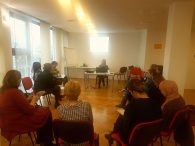Module on subject:
“High-conflict divorces, manipulation and alienation of the child”
was held:
from 24.-26.11.2017. at Ekonomskom fakultetu Univerziteta u Sarajevu – E-Net centar (3. sprat)
The module was led by Prof. Dr. Gordana Buljan Flander, clinical psychologist and psychotherapist. Director of the Polyclinic for the Protection of Children and Youth of the City of Zagreb

Participants improved their knowledge and skills in recognizing:
✓ harmfulness of parental conflict to children,
✓ high-conflict divorces, their frequency and characteristics,
✓ high-risk couples at risk of divorce,
✓ research on transgenerational transmission of the consequences of conflict and divorce through family history,
✓ categorization of parental conflict according to theoretical and empirical data,
✓ psychological basis of the harmfulness of parental conflict for children,
✓ recognizing and assessing the harmfulness of parental conflict on certain groups of children,
✓ assessment and explanation of the best interests of the child in the divorce of the parents,
✓ Article 12 of the Convention on the Rights of the Child – the child’s opinion is not always in his best interests; how to examine it and argue the opinion,
✓ recognizing the manipulation of children and the alienation of the child from the parents,
✓ distinguishing the forms and reasons for the child’s rejection by the child,
✓ perception and interpretation of manipulative behaviors in accordance with contemporary literature,
✓ demystification of manipulation as a rare behavior,
✓ understanding of the alienator and his basic characteristics,
✓ power analysis, toxic triangle of alienation in relation to attachment theory,
✓ taking control of the alienator by the system,
✓ recognizing manipulation as emotional abuse according to modern scientific knowledge,
✓ legal action in case of manipulation – criminal charges for emotional abuse,
✓ deeper understanding of the alienated child, examination of alienation / level of alienation of the child in practice,
✓ analysis of relevant factors in assessing allegations of child abuse during and after parental divorce, and
✓ writing findings, opinions and cooperation with institutions.
With joy and respect,
BHIDAPA
